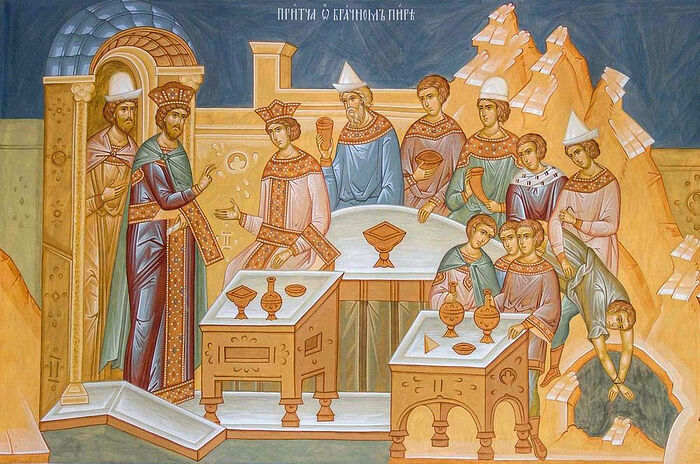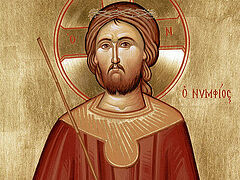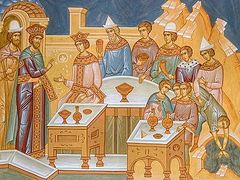And Jesus answered and spake unto them again by parables, and said, The Kingdom of Heaven is like unto a certain king, which made a marriage for his son, And sent forth his servants to call them that were bidden to the wedding: and they would not come. Again, he sent forth other servants, saying, Tell them which are bidden, Behold, I have prepared my dinner: my oxen and my fatlings are killed, and all things are ready: come unto the marriage. But they made light of it, and went their ways, one to his farm, another to his merchandise: And the remnant took his servants, and entreated them spitefully, and slew them. But when the king heard thereof, he was wroth: and he sent forth his armies, and destroyed those murderers, and burned up their city. Then saith he to his servants, The wedding is ready, but they which were bidden were not worthy. Go ye therefore into the highways, and as many as ye shall find, bid to the marriage. So those servants went out into the highways, and gathered together all as many as they found, both bad and good: and the wedding was furnished with guests. And when the king came in to see the guests, he saw there a man which had not on a wedding garment: And he saith unto him, Friend, how camest thou in hither not having a wedding garment? And he was speechless. Then said the king to the servants, Bind him hand and foot, and take him away, and cast him into outer darkness, there shall be weeping and gnashing of teeth. For many are called, but few are chosen (Mt. 22:1-14).
Today’s parable of the wedding feast can be understood in the context of the global change that took place in two periods of human history: the Old Testament and the New Testament.
The first part of the parable of the Lord Jesus Christ refers to the era of the Old Testament. Then only the people of old Israel, who were entrusted with keeping the faith in the One True God in the ways of Divine Providence, were invited to His Church. It was not easy for Israel. In some ages that nation produced great heroes of the faith, in other ages—notorious apostates. Truth and sin, light and darkness—all was mixed up. It is enough to open the pages of the Old Testament to understand how difficult the struggle for the preservation of the faith was not only for prophets and kings, but also for the ordinary people of Israel.
At some point God, Who had for many centuries called one people to keep the true faith, changed the whole picture of human history. Instead of the division of humanity into those who knew the One True God and all the others, something new emerges.
In the New Testament, through Christ and in the Risen Christ, everyone is invited to the wedding feast in the Church, where it is good and where God is at the head. Good and bad, as today’s Gospel says, were gathered at the crossroads and by the roadside—that is, all who responded. Now there is an absolutely different division—not into good and bad, as the boundary between, say, virtuous Christians and sinful atheists is sometimes seen, but into those who responded and those who did not go and refused to come when they were being dragged off the road at the time when they were tramps, thieves, prostitutes and corrupt financial inspectors (that is, publicans) and the like. But they were invited anyway and told only one thing: “Agree to come.”
This new division that arises in the human race has been running through the entire history of mankind since the beginning of the New Testament, progressively and expansively. It is said elsewhere in the Gospel that at the end of time, the Gospel will be preached to all nations, every nation will be faced with the choice of accepting, or equally freely rejecting, the call of God to come to the feast (cf. Mt. 24:14).
It is very important for us to understand that salvation and the gates of salvation don’t open to comparatively better people, but to those who are inwardly aware that without God and without His palace, feast, and His mercy, salvation cannot be attained. According to God’s plan, a Christian should be the one who realizes that he is a dying creation, who does not want to perish and accept sin as the norm of life, but understands that he will never cope by himself and a Creator is needed for salvation.
However, one man who comes to the feast is driven away. The master of the feast, the bridegroom, sees a guest who has no festive garment on, and he asks him: Friend, how camest thou in hither not having a wedding garment? (Mt. 22:12). And he does not answer, because he has nothing to say, because he could have put it on and could have used it. And then he is cast into outer darkness, where there is weeping and gnashing of teeth, where there is punishment. And Christ pronounces rather menacing words: For many are called, but few are chosen (Mt. 22:14).
Why does this happen to this man? We should understand that people who would come to a wedding feast in the Ancient East were expected to take off their everyday clothes, wash, freshen up, and leave behind all the situations that they had beyond the threshold of the bridechamber. In the language of the Church it is called repentance. It is often called the “washing of repentance”, or the “washing of confession”, because a person is washed inwardly through the expression of his intention to become different from what he was. But to try to get into the feast, to secure a place in the Church without inward repentance is a dead-end street that leads to the perdition described in today’s parable.
Things don’t necessarily develop by leaps and bounds. The swiftness of the parable events is from the perspective of eternity, not the length of human life on earth. But we can recall the words of an ancient saint, which, alas, sound too optimistic for our modern state, although they are quite tough. He told critics of the early Church: “What do you want? The Church is not a community of saints here on Earth—it is a crowd of penitent sinners gathered from among you.” The trouble with our modern Church life often lies in the fact that we are undoubtedly a crowd of sinners, but not always penitent sinners. Here we mainly mean those who are inwardly aware of their unworthiness, and therefore look at the weaknesses and sins of others from a different perspective. A penitent sinner will not look at the sin of another in the same way as someone who considers himself to be righteous.
Today’s Gospel is a reminder of the possibility for everyone through a response to enter the Kingdom of God, the beginning of which here on Earth is the Church. It is a reminder that no matter what riffraff you belong to or what has accumulated in your life, you are still invited. There is only one condition—to see yourself inwardly as you truly are, disagree with this state, and turn to God with supplication in order to rise and walk towards Heaven.




